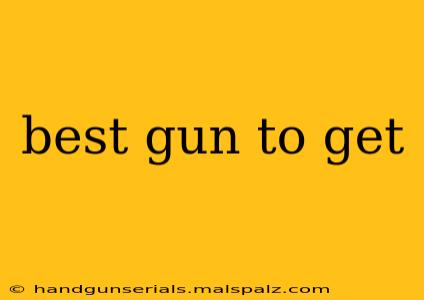Finding the Best Gun for You: A Comprehensive Guide
Choosing the right firearm is a deeply personal decision, influenced by a variety of factors far beyond simple preference. This guide aims to provide a framework for responsible gun ownership, helping you navigate the process of selecting the best gun to meet your specific needs and circumstances. This is not an endorsement of any specific firearm; responsible gun ownership includes thorough research and understanding of local laws and regulations.
Understanding Your Needs: The Foundation of Gun Selection
Before diving into specific models, it's crucial to define your purpose. Are you seeking a firearm for:
-
Self-defense? If so, consider factors like ease of use, concealability (if necessary), reliability under stress, and ammunition availability. Compact handguns or smaller shotguns are often favored for home defense.
-
Hunting? The ideal choice will depend heavily on the game you'll be hunting. Rifles are common for larger game, while shotguns are versatile for smaller game and waterfowl. Caliber and ammunition selection are paramount here.
-
Sport shooting? This opens a wide range of options, from pistols and rifles designed for target practice to shotguns for clay shooting. Accuracy, ergonomics, and features like adjustable sights are key considerations.
-
Collecting? This focuses on historical significance, rarity, or aesthetic appeal, often disregarding practical considerations.
Key Factors to Consider: Beyond the Purpose
Once you've established the primary purpose, delve deeper into these essential factors:
-
Caliber/Gauge: This refers to the diameter of the bullet (caliber) or the diameter of the shotgun's barrel (gauge). Larger calibers/gauges generally deliver more stopping power but with increased recoil. Smaller calibers offer greater control and less recoil but may have reduced stopping power.
-
Action Type: This describes how the firearm operates. Common action types include semi-automatic (self-loading), revolver (cylinder-based), bolt-action (manual bolt operation), pump-action (manual pump operation), and lever-action (manual lever operation). Each has its own advantages and disadvantages regarding speed of operation, reliability, and maintenance.
-
Ergonomics: A gun that fits your hand comfortably and allows for proper grip and sight alignment will significantly improve your accuracy and control. Consider factors like grip size, weight, and overall balance.
-
Reliability: Choose a firearm known for its robust construction and consistent performance. Research reviews and testimonials to gauge the reliability of different models.
-
Safety Features: All firearms should include essential safety features, such as a manual safety, drop safety, and proper trigger design.
-
Cost: Firearm prices range widely depending on manufacturer, model, features, and condition. Set a realistic budget before beginning your search.
The Importance of Training and Responsible Ownership
Regardless of the firearm you choose, proper training is absolutely essential. Seek professional instruction from certified instructors on safe handling, storage, cleaning, and responsible use. Familiarize yourself with your local and state laws regarding firearm ownership, licensing, and use.
Remember, responsible gun ownership involves a commitment to safety, knowledge, and legal compliance. This guide provides a starting point; thorough research and professional guidance are crucial before making a purchase. Consult with experienced firearm owners, visit reputable gun stores, and attend safety courses to make an informed and responsible decision.

